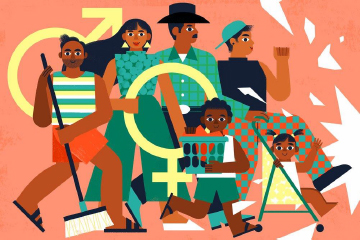What is Machismo?
Machismo, or hyper masculinity, is a culture that encourages an extreme masculine identity. It is characterized as a series of beliefs that allow for dominant attitudes and behaviors constructed to preserve and strengthen male dominance over women. “Manly” characteristics include being courageous, showing no emotions, being in control of everything or anyone around, being the breadwinner, head of household, and decision maker of the home. Machismo is something that is taught and passed down through generations. In Latin culture, machismo creates an environment where men feel the need to have control over women. Men who are taught to be machista are also taught to believe that they need to have authority over women simply because they are men. Latino men are raised to be anything but weak. To this day, in Latino communities, it is believed that men are superior to women.
Men being raised with machista culture are taught to constantly assert dominance in ways such as verbal abuse, physical abuse, blackmailing, and more (Hernandez, 2021). In Latino culture, there has been a long-standing acceptance of male violence and domination. Gender roles are established early on where women carry traditional roles in the household and family upbringing, while men focus on income and labor. “They stem from a deeply rooted sense of machismo: men are raised to understand their role in society as providers and protectors, and when that role is challenged, many react with violence,” (Whelan, 2019). In some cases, the machismo culture is responsible for the sexual assault and violence women face. This is seen in Latin American in the number of women who are used, murdered, and discarded by men who no longer “need’ them. “According to a 2018 report from Igarapé Institute Latin America has 8% of the world’s population, but 33% of its homicides and four countries in the region – Brazil, Colombia, Mexico and Venezuela – are home to a quarter of all the assassinations on the planet). When a heavily macho culture is combined with weak institutions, faulty justice systems and easy access to firearms, like it is in these regions, the result is lethal – for women, children and men,” (Scarleteen, 2023).
Women Machistas
Women machistas do exist! They are generations of women who live or grew up in Latin American and immigrated to the Unites States truly believing that their happiness depends on a man. Women who uphold the machista culture often place a higher value on the lives, opinions, and thoughts of men more than women. Generations of women have internalized misogyny that creates an unconscious preference for men. They were raised to believe that women who chased after equal rights with men were just being rebellious or causing attention. In the case of sexual assault incidents, most cases go unreported because women ae afraid of losing the man of the house or bringing social shame to their family. Machista women live with unconscious bias and prejudice against women, including their own daughters.
In some Latin or Hispanic families, machismo among women goes beyond the patriarchy and is rooted in religion. It is common for machista women to set standards around their daughters’ pureness and submissiveness. Generations pass down the domesticated roles that grant women as the caretaker and responsible ones in the family. For some of us, it’s easy to recall having to serve our brothers and dad their dinner plate before serving our mom or ourselves. Latino sons are given more liberty with household duties, responsibilities, and social norms. A machista mom for instance, can be seen telling her son it’s okay to stay out past midnight, but insisting her daughter having a chaperone and to be home by 9PM. This is because, God forbid, y uno meta la pata. A euphonism for screwing up and getting pregnant. The truth is, in the case of some machista women, their unconscious bias, misogynistic mindset, standards and expectations, and level of femininity, come from years of generations before them.
Unlearning Machismo
To end machismo, we must actively fight against stereotypical misogynistic ways of thinking. It’s important to feel comfortable and empowered to interrupt conversations that start with “ eso no es para Niñas” or “ los niños no lloran.” Speaking out and educating others about the harmful impact of their words aids in diminishing machismo culture. Recognizing dangerous attitudes and behaviors and holding individuals accountable for their toxic mindset is also a part of the work. It will take a collective community of newer generations to heal the wounds of those that came before us. It’s important to remember along the journey that our parents loved us and what they passed on to us is what was taught to them years before. Accepting their perspectives and engaging them in a respectful conversation can shift the family dynamic. If all else fails, make the decisions that best benefit yourself and your family. Lastly, encourage men to speak out, act, and change the narratives. Men who participate in the dismantling of machismo set new expectations for the generations to come.
So, as we raise new generations of Latinos, let’s set forth the effort to create boundaries and rid old ways of thinking. Let’s empower our children with knowledge about our cultural roots and the impact it has had on politics, society, religion, and day to day life. Bring awareness to individuals who engage in toxic masculinity and hold each other responsible.
Written by:
Xochitl Villarreal, Intern
December 6th, 2023
IMAGE: © LORIS LORA | LORISLORA.COM|LOS ANGELES, CA
Resources:
- https://www.wsj.com/articles/a-horrible-culture-of-machismo-woman-struggle-with-violence-in-mexico-11556978401
- https://www.michigandaily.com/michigan-in-color/machismo-culture-must-go/
- https://medium.com/@ricky.hernandez/macho-culture-machismo-in-latin-culture-9bf6e973c2a1
- https://www.sheknows.com/parenting/articles/2485851/raising-latinx-children-machismo-homophobia-culture/
- https://www.scarleteen.com/article/politics_sexual_identity_gender_etc/machismo%C2%A0how_toxic _masculinity_harms%C2%A0latinx_people_an
- https://luzmedia.co/mi-mama-es-machista

